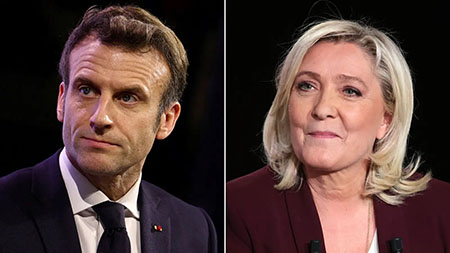Special to WorldTribune.com
France faces a dilemma. Does a successful and prosperous West European state wish to gamble with its future? Or does that state, feeling the popular anxiety from high food and fuel prices, crime and a constricting COVID pandemic, still hold to the status quo?
Now with the second round of the French Presidential elections upon us, the choice and political rematch is between the incumbent President Emmanuel Macron and his Eurosceptic opponent Marine Le Pen of the once politically reviled National Front but now rebranded populist National Rally.
During the first round of the elections President Macron won 28 percent of the vote versus 23 percent for LePen. This was largely expected. But contrary to the contest five years ago when a young and upstart Macron crushed his opponent under a wave of 66 percent of the vote, this political duel is set amid gloomy economic uncertainty and dangerous geopolitical tensions in Europe.

Despite more than a dozen political parties vying for the five-year presidency, contemporary French politics is defined less by following political isms or traditional Left/Right political divides than supporting ideas along cultural and social fault lines.
For example, the three major post WWII political movements, the Gaullists, the Socialists and the Communists combined, gained just under ten percent of the entire vote! The Socialists, led by the arrogantly incompetent and unpopular mayor of Paris garnered less than 2 percent of the results!
Others, like the loony Left Popular Union only reached 22%. Voters are angry. Many of the now fractured Left are protesting under banners, “No Macron, No Le Pen!” Many will not vote at all, thus making the second round vote far less predictable.
Other politicos have made their peace or are trying to make a deal with the President; immediately after the first round of voting the Socialist candidate Anne Hidalgo, and the Gaullist Valerie Pecresse, endorsed Macron. So too did former Socialist President Francois Hollande as well as Gaullist president Nicolas Sarkozy.
But there’s nearly 50 percent of the vote not shared by the two first round winners. Now in a last minute appeal to these voters, Macron has pledged for a wider Green agenda for France and pushed for ecological planning, a plank of the Leftist parties. Ironically France generates 75% of its electricity from nuclear power.
The largely successful but technocratic Macron embraces the status quo as a pro European Union leader looking to the polestar of Brussels.
LePen endorses a fuzzy vision of French identity but is actually pulled by disparate nativist and murky populist forces of the far right and left which are clearly less conservative than isolationist. She appeals to the growing margins of French society which have been bypassed by the prosperity and see themselves the victims of a nation run by elite educated politicians and what are called the Bien Pensants, those who know better!
Appealing to France’s dangerously eroding but volatile middle class may be the silver bullet for Le Pen. Cut the high Value Added Tax (VAT), control illegal immigration and moderate fuel prices. These are the people who composed the massive Yellow Vest movement which for nearly a year whose protests starting in 2018, shook the foundations of the state and brought about some lackluster reforms.
Countering the high cost of living, Le Pen proposes eliminating the ubiquitous VAT of 20% on food and household items and cutting the tax on fuel and electric to 5%.
Despite his more classically Statist policies, Macron has promoted a surprisingly dynamic labor market and has reduced a stubborn unemployment rate to 7 percent, the lowest level in fifteen years. Equally he has promoted high tech investments to keep pace with the world.
In a sense Macron is comfortable in globalized political Summit settings like Davos, Le Pen is more at home in rural farmers markets.
Macron sees himself as a key player in the Ukraine war; before the conflict he conducted a high profile meeting with Putin on the eve of the conflict and still has regular calls promoting stillborn diplomacy with Russia. Nonetheless he told a rally; “I want a France in a strong Europe that maintains its alliances with the big democracies in order to defend itself.”
Le Pen on the other hand, once maintained cozy political ties with the Russian leader but now openly condemns the Ukraine war. She’s no fan of NATO, but neither have been most of the French historically.
The weekly magazine Le Point wrote, “Macron/LePen; European sovereignty or National Sover-eignty?” The bets are down.
John J. Metzler is a United Nations correspondent covering diplomatic and defense issues. He is the author of Divided Dynamism the Diplomacy of Separated Nations: Germany, Korea, China (2014). [See pre-2011 Archives]

 By
By